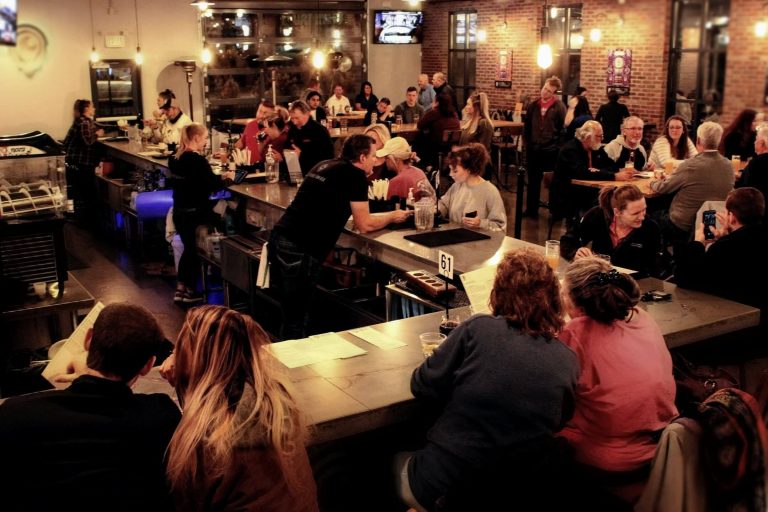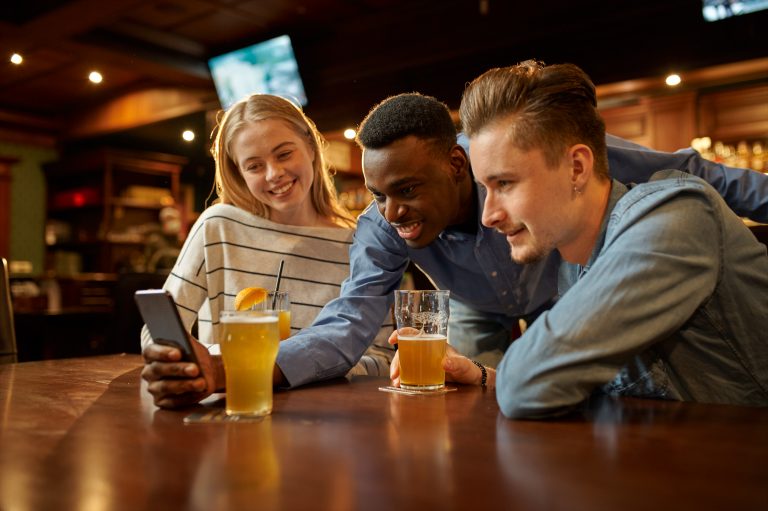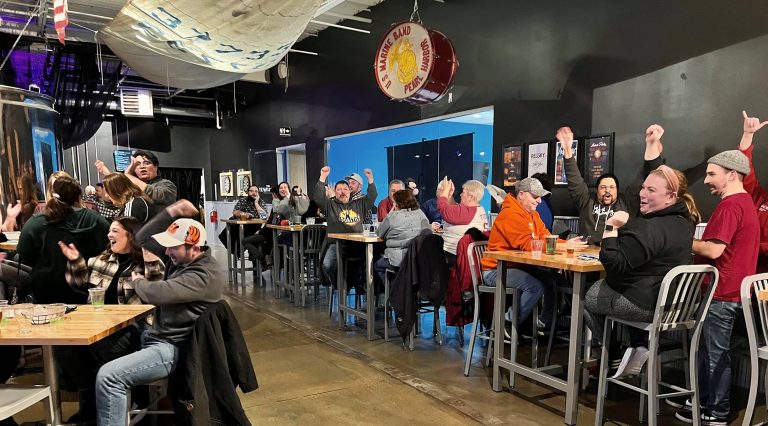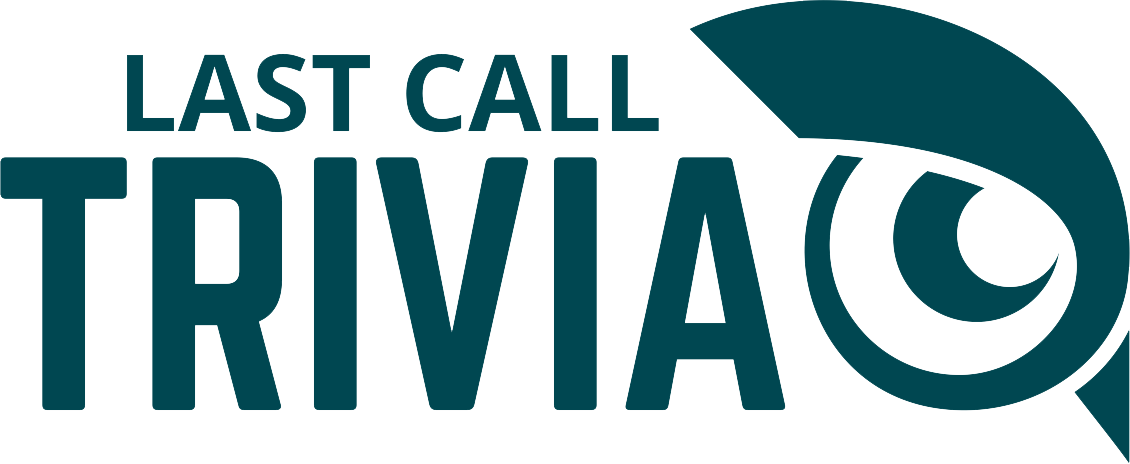
The Humble Beginnings of Pub Quiz
Our story begins a long time ago in a land far away. 1970s United Kingdom, to be exact. During this time, pub quizzes were played in a few pubs mainly in the North of England. They were a popular activity for patrons, but they were unorganized and localized.
That is, until Sharon Burns and Tom Porter entered the scene. In 1976, Burns and Porter founded their own pub quiz league and traveled the country to spread the word. They sold their quizzes to pubs not as a game but as a marketing strategy. It was an innovative way for pubs to bring in customers on their slower evenings.
And their strategy worked. Burns and Porter soon had over ten thousand teams playing at their pub quizzes each week. It’s safe to say that pub quiz took the UK by storm and its success continued to grow even across the pond.
Bar Trivia Arrives in America
Thanks to both the success of pub quiz events in the UK and the release of Trivial Pursuit, similar events took off in America in the mid-1980s. The term pub quiz is used by some but it’s more commonly known in the US as “bar trivia.”
The name received a rebrand but the basic concept remained the same. Trivia companies marketed their services to bar owners as a way to fill seats on traditionally slower evenings. Which means, of course, that the most popular days are Monday through Thursday.
The practice has been steadily growing in popularity since its arrival to America in the mid-1980s. It’s become a part of American culture, as is evidenced by one of the most loved TV shows of all time, Jeopardy!, which began its run in its current format in 1984.

How are American shows different?
As it turns out, it’s fitting that the US has adopted its own name for the traditional pub quiz. There are a few key differences between competitions in the US versus the UK.
First, the demographics at shows in the US tends to skew younger than the UK crowds. The average age of players in the US is mid-20s to mid-30s, while the average player age in the UK is mid-40s. Which is great news for bar owners in the US looking to reach the elusive millennial market.
Also, games in the US tends to be more informal and social than UK pub quizzes. This could be because the vast majority of shows in the US are free to attend. On the other hand, it’s common for UK pub quizzes to have an entry fee pooled towards cash prizes.
The more casual approach in the US has led to the evolution of different game formats and styles. The “best” version comes down to player preference and bars that offer a more customized experience have an advantage.
Another interesting difference is the saturation of pub quiz locations in the UK compared to the US. There are roughly 22,000 pub quizzes in the UK, compared to about ten thousand shows in the US. That means, there are approximately 11 times more locations in the UK than the US per capita. Which goes to show that there is still a huge opportunity for growth in America.
Traditional Vs. High-Tech
The game rules and formats vary between Trivia companies, but there are two main types of services available in the US.
First is the traditional live Trivia Night. At these events, a host runs the show, reading the questions aloud and interacting with teams throughout the game. These events provide consistent business week after week and teams plan their schedules around attending.
Some locations opt for a self-run version of the game, which is either played on a provided tablet, or by downloading a mobile app. Individual, self-paced games don’t come with the same benefits as live events. While live events will bring people out to the bar week after week, individual versions don’t have the same draw. It’s a way for a customer to pass the time while waiting for their order, not a social experience.
In fact, while there was a spike in individual table games in the early 2000s, locations have steadily been migrating back to live shows.

What types of services are available?
Both nationwide and regional Trivia companies offer hosting services. With these services, the company provides all of the equipment, materials, and host for the bar. Many of the leading Trivia companies in the industry were started in the early 2000s.
Other bar owners opt to run their events in-house. For some, that means creating their own shows from scratch, which takes hours of work each week. Others choose to purchase pre-made shows. This can lead to questions which are too difficult, outdated, or just not a match for the intended crowd. Alternatively, bar owners can subscribe to Last Call Trivia to save time on researching and fact checking questions. Last Call Trivia allows users to easily host their own show by accessing a new, expertly-written game each week.
The game formats differ from company to company. Some Trivia companies create shows that lean towards the pub quiz style, with lots of questions asked back-to-back. Other companies create shows with less questions but more time in between to give teams a chance to discuss (and eat/drink).
Some Trivia companies also include rounds with different types of questions. For example, some include a picture round, a music round, or a themed round.

Bar Trivia in the Past 10 Years
As mentioned, many of the leading Trivia companies in the US began in the early 2000s. So, what was the impact of The Great Recession on the industry? And the answer is: It’s complicated.
There’s a saying that bars are recession-proof because when people are happy they drink and when they’re sad they still drink. But, it’s more accurate to say that alcohol is recession-proof.
This was a double edged sword for hosting companies. With lower alcohol sales, bar owners had a smaller budget for entertainment. On the other hand, by offering a trivia night, bars could encourage customers to come out and enjoy some much needed fun – with the chance of winning a bar tab.
Overall, business was less steady than usual, but the average number of bar trivia locations in the US wasn’t steeply affected by the recession.
How will things change in the Next 10 Years?
So, what’s next? As statistics show, there’s still lots of room for growth in the US.
In addition to the national and regional Trivia companies, there is also a growing trend of individual hosts offering their services as a side hustle.
Also, with the expanding DIY trend, keep an eye out for more bars to move to an in-house performance. That might mean creating their shows from scratch, or using a service like Last Call Trivia to run their show smoothly and easily. Either way, it allows bar owners to reduce the cost of their event by using assets they already have on hand (sound equipment, host, etc).
How has the culture changed in America?
Trivia has been a staple in the US for nearly 40 years. Throughout that time, it’s become clear that it’s embedded in American culture. Think of the different icons that have risen to the forefront of pop culture throughout that time.
There are the staples like Jeopardy! and Trivial Pursuit. More recently shows like, Who Wants to be a Millionaire?, Cash Cab, and Are You Smarter than a 5th Grader, have also had successful TV runs. And in 2017, the HQ Trivia app launched and quickly went viral.
The popularity of these shows and apps can be explained by several factors. First, winning often involves a prize. At events, winning teams are typically given a gift card or free bar tab. With HQ, the winners split a cash prize. Tournaments offer even larger payouts.
In addition to the tangible prizes that players can win, it also offers a deeply rooted, intrinsic benefit: It makes us feel good. It gives us the chance to put all of our “useless” knowledge to use. Whether a player is at an event with their friends, or watching Jeopardy! in their living room, there’s a rush that comes with getting a question right.
Between the cold hard cash and the warm and fuzzies, it’s no wonder that it’s so popular. Trivia continues to weave itself throughout the fabric of American culture and it’s not going anywhere anytime soon.
Trivia Night is the answer.
It is interesting to see the success of traditional live events, as other industries are becoming more high-tech. The practice offers a much needed mid-week break for players, a boost in revenue for bar owners, and a feel-good moment for everyone. For good reason, it seems like it is here to stay.
